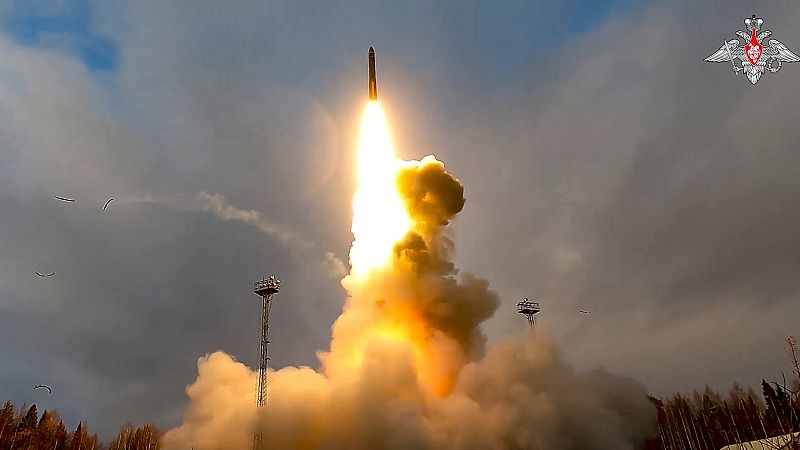Fact-check: What do we know about Russia’s nuclear arsenal?

Russia’s nuclear arsenal is under fresh scrutiny after an intermediate-range ballistic missile capable of carrying an atomic warhead was fired into Ukrainian territory.
President Vladimir Putin says the unprecedented attack using the so-called "Oreshnik" missile is a direct response to Ukraine’s use of US and UK-made missiles to strike targets deep in Russian territory.
He has also warned that the military facilities of Western countries allowing Ukraine to use their weapons to strike Russia could become targets.
The escalation comes days after the Russian President approved small but significant changes to his country’s nuclear doctrine, which would allow a nuclear response to a conventional, non-nuclear attack on Russian territory.
While Western officials, including US defence secretary Lloyd Austin, have dismissed the notion that Moscow’s use of nuclear weapons is imminent, experts warn that recent developments could increase the possibility of nuclear weapons use.
Here’s what we know about Russia’s inventory of atomic weapons.
How big is Russia’s nuclear arsenal?
Russia holds more nuclear warheads than any other nation at an estimated 5,580, which amounts to 47% of global stockpiles, according to data from the Federation of American Scientists (FAS).
But only an estimated 1,710 of those weapons are deployed, a fraction more than the 1,670 deployed by the US.
Both nations have the necessary nuclear might to destroy each other several times over, and considerably more atomic warheads than the world’s seven other nuclear nations: China, France, India, Israel, North Korea, Pakistan and the United Kingdom.
Of Moscow’s deployed weapons, an estimated 870 are on land-based ballistic missiles, 640 on submarine-launched ballistic missiles, and potentially 200 at heavy bomber bases.
According to FAS, there are no signs Russia is significantly scaling up its nuclear arsenal, but the federation does warn of a potential surge in the future as the country replaces single-warhead missiles with those capable of carrying multiple warheads.
Russia is also steadily modernising its nuclear arsenal.
What could trigger a Russian nuclear response?
Moscow’s previous 2020 doctrine stated that its nuclear weapons could be used in response to an attack using nuclear or other weapons of mass destruction “when the very existence of the state is put under threat.”
Now, the conditions under which a nuclear response could be launched have changed in three crucial ways:
- Russia will consider using nuclear weapons in the case of a strike on its territory using conventional weapons, such as cruise missiles, drones and tactical aircraft.
- It could launch a nuclear attack in response to an aggression by a non-nuclear state acting “with the participation or support of a nuclear state”, as is the case for Ukraine.
- Moscow will also apply the same conditions to an attack on Belarus’ territory, in agreement with President Lukashenko.
Is there a rising nuclear threat?
The size of the world’s nuclear stockpiles has rapidly decreased amid the post-Cold War détente. The Soviet Union had some 40,000 warheads, and the US around 30,000, when stockpiles peaked during the 1960s and 70s.
But FAS warns that while the overall number is still in decline, operational warheads are on the rise once again. More countries are also upgrading their missiles to deploy multiple warheads.
“In nearly all of the nuclear-armed states there are either plans or a significant push to increase nuclear forces,” Hans M. Kristensen, Director of the Nuclear Information Project at the Federation of American Scientists (FAS), said in June this year.
Is the West reacting?
When Putin approved the updated nuclear protocol last week, many Western leaders dismissed it as sabre rattling.
German Foreign Minister Annalena Baerbock said Germany and its partners would "not be intimidated” and accused Putin of "playing with our fear.”
But since Russia used a hypersonic ballistic missile capable of carrying a nuclear warhead in an attack on Dnipro, European leaders have raised the alarm.
"The last few dozen hours have shown that the threat is serious and real when it comes to global conflict," Polish Prime Minister Donald Tusk said on Friday.
According to Dutch media reports, NATO's secretary-general Mark Rutte is in Florida to urgently meet President-elect Donald Trump, potentially to discuss the recent escalation.
NATO and Ukraine will hold an extraordinary meeting in Brussels next Tuesday to discuss the situation and the possible allied reaction, according to Euronews sources.
Today

